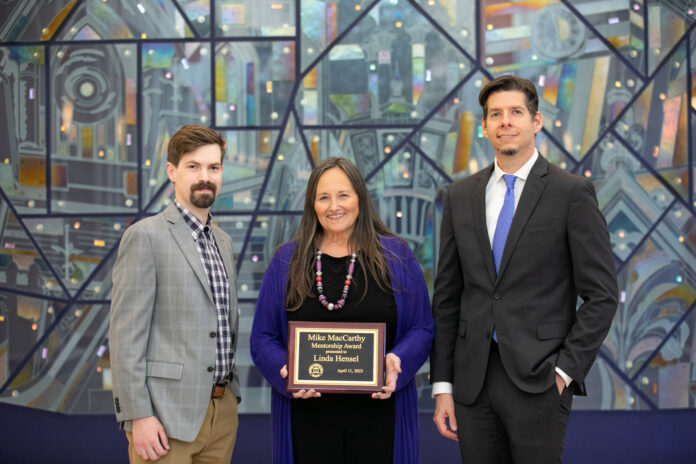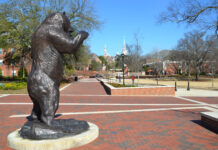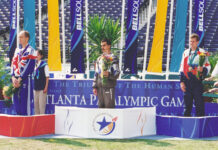
Mercer University has awarded Dr. Linda Hensel, professor of biology in the College of Liberal Arts and Sciences, with the Mike MacCarthy Mentorship Award for her leadership in providing hands-on research experiences to undergraduate students.
She received the award on April 11 during the annual student recognition banquet held by the Office of National Fellowships and Scholarships.
“Mentoring is the most intensive and most transformative form of teaching. It involves developing a personal relationship with a student, investing time and energy in their growth and development, encouraging them to pursue challenging opportunities, and, most importantly, caring about them,” said Dr. David Davis, director of the Office of National Fellowships and Scholarships.
“Mentoring is work, but it is often the least visible and least rewarded form of academic work. This award signifies the value of mentoring, commemorates the legacy of a great mentor, and recognizes Mercer faculty members who have dedicated their time and energy to their students’ growth,” he said.
Much of Hensel’s mentorship comes through her work with the American Association for the Advancement of Science’s Continuing Umbrella of Research Experiences, known as CURE. The CURE program began after the association observed various shortcomings in science education throughout the country from middle school to undergraduate levels.
In Dr. Hensel’s CURE program, done in conjunction with Associate Professor of Chemistry Dr. David Goode, undergraduate research students in biology and chemistry have collaborated through a course-based program and authentic research experiences. In addition to providing hands-on learning, the program helps undergraduate students begin working toward a Ph.D, if that’s what they want to pursue.
Prior to the CURE program, “many science laboratory experiences were done using ‘cookbook’ labs,” Dr. Hensel said. “They weren’t doing the hypothesis or experiment part. They learned how to use equipment, but they didn’t learn how to do science, and the students weren’t engaged.”
Mercer’s CURE program seeks to create drugs that inhibit biofilm formation. In it, students are able to test different combinations of antibiotics to get rid of biofilm formation in selected bacterial samples.
“In the ‘80s, scientists steered away from biofilm because it was messy,” she said. “But now we realize that biofilm correlates with cancer, cavities and other afflictions. This is the fascinating stuff Mercer is doing.”
Dr. Hensel said with the right motivation, students can work beyond “cookbook” labs. She has seen how well math modeling and examples of scientific research have helped students.
“The American Association for the Advancement of Science was absolutely right in that freshmen and sophomores can do research, but they need to be doing real research, or we’re going to lose the real innovative, bright ones,” she said.
Because of the CURE program, students at Mercer now are more prepared to pursue graduate degrees, like a Ph.D. or Doctor of Medicine, or work at places like the Centers for Disease Control and Prevention or National Institutes of Health, she said.
In May, Dr. Hensel — along with Dr. Chris Grant, professor of political science, and Lauren Benedict, adjunct instructor of integrative studies — led a Mercer On Mission team to the country of Georgia, working with the elderly to compare U.S. hospice care, government and policy.
As part of the trip, the team planned to meet with Dr. Nina Chanishvili of the George Eliava Institute of Bacteriophages, Microbiology and Virology in Tbilisi to learn about phage medicine and tour the laboratories. Phages are viruses that target bacteria.
Dr. Hensel said she has the utmost respect and admiration for students working in her program.
“They’re like my children,” she said. “They’re going to be responsible for making the world a better place and fixing many of the issues that my predecessors and my generation left us with. That’s why I enjoy science so much because it really does help the world.”
Class of 2023 graduate Sophia Guo, who majored in biochemistry and molecular biology, has been with Dr. Hensel since the fall of 2020.
“Working with Dr. Hensel helped me a lot,” she said. “I wanted to quit pre-med and my biochem major around sophomore year, but being on her research team helped me regain my passion for medicine and science. Now, I’ll be going to medical school, and this is all thanks to Dr. Hensel.”
Guo loved working in the CURE because she enjoyed the challenge of authentic research.
“Dr. Hensel made sure all her research students were set to be successful when they graduate,” she said. “If we lacked in any aspect of grad school preparation, all we had to do was tell her, and she would have a solution.”
Dr. Hensel, who retired at the end of the spring semester, said she cried when she received the Mike MacCarthy Mentorship Award.
“It was a nice way to end the year,” she said. “I didn’t think anybody noticed what I do. The students notice, but I didn’t think anybody in other departments noticed since we’re all so busy.”
The Mike MacCarthy Mentorship Award is named for the late Dr. Michael MacCarthy, associate professor of environmental and civil engineering and director of the engineering for development program. He died in 2021. Last year, German professor Dr. Edward Weintraut, now retired, was named the first recipient of the award.









